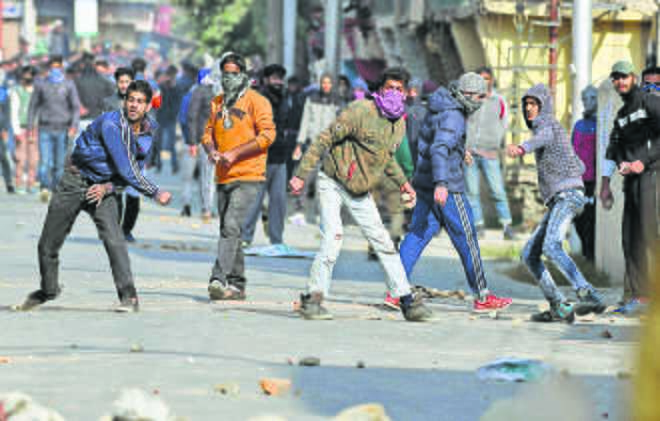
LOCAL SUPPORT TO MILITANTS: Civilians in J&K at times resort to attacking the security forces with stones.
Lt-Gen Raj Kadyan (Retd)
Former Deputy Chief of Army Staff
IN his conventional training for war, a soldier is taught the principle of 'shoot to kill'. While deployed to control domestic disturbances, this principle gets modified to 'shoot to incapacitate'. Even this shooting is below the waist, using minimum force. In either case, the soldier always 'fires for effect'. And this is what distinguishes the Army from the police forces that routinely have to fire in the air to disperse unlawful crowds.
Avoiding or minimising collateral casualties to the civilians forms part of the Army's guidelines or 'commandments' issued to every unit deployed in tackling insurgency situations. Adherence to the resultant 'standard operating procedure' is strictly expected and enforced. Given the unclear and confused nature of the situation, mistakes do happen. At times, operations have even been abandoned and militants allowed to slip away, only to avoid civilian casualties.
Showing sensitivity, the government is constantly on the lookout for means and methods to avoid fatalities through collateral damage. Non-lethal weapons, such as the pellet gun, have been tried, though even their use also raised a hue and cry. Another proposal, reportedly under examination, is the induction of specialised dogs trained to control and disperse unruly mobs. Though, in the prevailing situation, in some parts of the Valley, their efficacy is open to serious question.
What has been happening in J&K for nearly three decades is not a classic insurgency that the Indian Army faced in Nagaland, Mizoram and elsewhere. There, the insurgents operated mostly in jungles where there was no risk of any collateral damage. But in J&K, it is a proxy war, waged by Pakistan, with no holds barred. Terrorists take shelter in houses in villages/towns, which increases the risk of collateral damage.
Examining the Dec 15 incident
In the incident of December 15, 2018 in Pulwama district, three terrorists were eliminated and one soldier was martyred. Unfortunately, seven civilians also lost their lives during the operation. Not unexpectedly, there was a lot of criticism of the security forces. While any death is deeply regrettable, the issue needs to be examined dispassionately.
Some parts of J&K have seen open support by locals for terrorists. The operations are hindered by a mass gathering of civilians. From forming a human shield between the security forces and holed-up terrorists, and thus facilitating the escape of the latter, the civilians have started attacking the security forces with stones.
There is no equivalence between the casualties suffered by the security forces and civilians. A soldier is deployed by order and is operating to protect national interests. He has no choice in the matter. On the other hand, the civilians rush to the encounter site by choice and of their own volition. They also know that by obstructing the operations of the security forces, they are helping terrorists who have taken up arms against the State. Their action, therefore, amounts to abetment to terrorism. Even before coming out to the encounter site, they are fully aware of the risks involved in their action.
In the December 15 encounter, a leaked video clearly showed the crowd attacking the heavily outnumbered soldiers with sticks and stones. Those who later criticised the soldiers — including some high-visibility politicians from the Valley — should introspect and analyse. What option do the soldiers have under such circumstances? Should they surrender meekly and get lynched? Or they take action in self-defence, which even the law permits? They chose the latter, and the only viable option.
The Dec 22 incident
A week later, the security forces carried out another operation on December 22 in the same Pulwama district. Since no civilians resorted to stone-pelting, the operation was conducted in a precise and clinical manner. Six terrorists were killed, including Soliha Akhun, the deputy of Zakir Musa, who heads the Al Qaida-affiliated Ansar-ul-Ghazwa-ul-Hind terror outfit. There was no collateral damage. Those that had condemned the Army for shooting 'innocent' and 'unarmed' stone-pelters on December 15, now strangely went silent.
The absence of stone-pelting on December 22 is, of course, no guarantee that such incidents are over for good. But it augurs well.
The security forces have eliminated over 250 militants in 2018. This is a great achievement and they deserve accolades and the gratitude of the country.
However, the killing terrorists per se is not synonymous with solving the problem. The latter is beyond the purview of the security forces; they are designed to handle only military problems. In the context of J&K, they can only play a complementary role to other government organs, by creating conditions of relative peace where normal work by the government and social organisations can be carried out.
Pakistan has been selling dreams of azadi to gullible Kashmiris. They have also been supplying jihadis the wherewithal to keep the violence going. Their aim is, of course, to destabilise India and they are using Kashmiris only as an expendable prop. As soon as the people in the Valley see through the game and realise the futility of violence, peace would be on the horizon.
The solution to the problem lies with the Kashmiri people. They need to dissuade their wards and the youth from joining or supporting terrorists. Governments can only provide material help and resources to maintain law and order. But the attitude and perceptions of people can be changed by themselves alone.



























